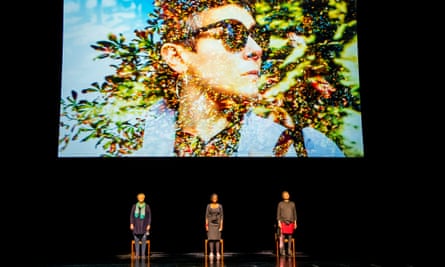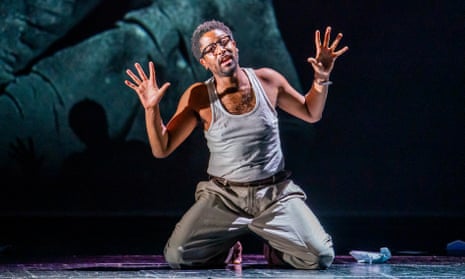The goodwill that inevitably greeted this double bill – a proper staged event with live music! – couldn’t quite hide the disappointment with the first half. Hannah Kendall’s opera The Knife of Dawn, originally staged at the Roundhouse in 2016, is a rather laboured and didactic piece that succeeds only in informing us about a largely forgotten moment in colonial history.
It follows the aftermath of the 1953 elections in British Guiana, the first under universal suffrage, which were overturned by British authorities. The story is told from the point of view of the Guyanese poet Martin Carter, one of the many members of the victorious People’s Progressive Party who was jailed. He is on hunger strike and is starting to hallucinate, haunted by offscreen female voices – his wife and daughter, other political prisoners, long-dead Guyanese slaves – who drive him to the brink of madness. Despite a fine performance by baritone Peter Braithwaite, the monologue lacks any dramatic momentum, mistaking showing for telling. We are told that Carter is a great poet, which he was, but it’s not evident from Tessa McWatt’s excruciating libretto, which spends an hour outlining the historical background and ends just as it starts to explore any artistic and emotional ramifications.

Much more effective is the second half of the bill, New Dark Age, in which existing compositions by three leading contemporary composers are reworked into a 10-part song suite that narrates post-pandemic life, accompanied by Grant Gee’s artful slow-motion film.
The only original piece is Anna Meredith’s swooping Fly By Night, but even the compositions that are more than five years old, such as Missy Mazzoli’s quartet from Vespers for a New Dark Age, setting poems by Matthew Zapruder, seem to have an eerie post-Covid resonance. The shimmering Vivaldi-meets-Philip Glass textures of Meredith’s Stoop seem to sum up a locked-down population straining to enjoy the bright sunshine of April 2020, while Anna Thorvaldsdottir’s two choral pieces – a blend of austere medieval plainsong and holy minimalism – serve as a threnody for the victims of the pandemic.
By the end of the suite, with Meredith’s bleak a cappella Heal You (text by Philip Ridley) and her icy, discordant, malfunctioning harpsichord-and-strings piece Low Light, the bemasked audience at the ROH seemed emotionally prepared for a second lockdown.

Comments (…)
Sign in or create your Guardian account to join the discussion